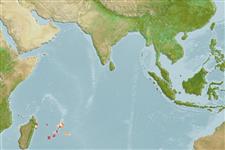Teleostei (teleosts) >
Ovalentaria/misc (Various families in series Ovalentaria) >
Pomacentridae (Damselfishes) > Microspathodontinae
Etymology: Stegastes: Greek, stegastos, -e, -on = covered (Ref. 45335).
Eponymy: Daniel Pelicier (1946–2018) was an aquarium fish collector and exporter in Flic en Flac (a village in Mauritius). [...] (Ref. 128868), visit book page.
Environment: milieu / climate zone / depth range / distribution range
Ecology
Marine; reef-associated; non-migratory; depth range 2 - 20 m (Ref. 9710). Tropical; 15°S - 25°S
Western Indian Ocean: Mauritius (Ref. 510) and Reunion (Ref. 53568).
Size / Weight / Age
Maturity: Lm ? range ? - ? cm
Max length : 14.0 cm TL male/unsexed; (Ref. 9710)
Dorsal spines (total): 14; Dorsal soft rays (total): 14 - 16; Anal spines: 2; Anal soft rays: 14 - 15. Generally brown to charcoal or blackish. Dusky gray lips; narrow golden margin on pupil. Blackish scale margins; scales with bluish centers on suborbital series and opercular bones; small sheath scales with bluish centers on basal portion of anal fin. Pectoral fins translucent with brown rays, base of uppermost ray bright blue. Scales on ventral surface of head cycloid, the rest ctenoid.
Adults inhabit rocky reefs with little coral and found near crevices and holes (Ref. 9710). They occur singly (Ref. 510). Oviparous, distinct pairing during breeding (Ref. 205). Eggs are demersal and adhere to the substrate (Ref. 205). Males guard and aerate the eggs (Ref. 205).
Life cycle and mating behavior
Maturity | Reproduction | Spawning | Eggs | Fecundity | Larvae
Oviparous, distinct pairing during breeding (Ref. 205). Eggs are demersal and adhere to the substrate (Ref. 205). Males guard and aerate the eggs (Ref. 205).
Allen, G.R. and A.R. Emery, 1985. A review of the Pomacentrid fishes of the genus Stegastes from the Indo-Pacific, with descriptions of two new species. Indo-Pac. Fish. (3):31. (Ref. 510)
IUCN Red List Status (Ref. 130435: Version 2024-1)
Threat to humans
Harmless
Human uses
Tools
Special reports
Download XML
Internet sources
Estimates based on models
Preferred temperature (Ref.
123201): 25.4 - 26.8, mean 26.2 °C (based on 28 cells).
Phylogenetic diversity index (Ref.
82804): PD
50 = 0.5000 [Uniqueness, from 0.5 = low to 2.0 = high].
Bayesian length-weight: a=0.02089 (0.00953 - 0.04582), b=2.98 (2.80 - 3.16), in cm total length, based on LWR estimates for this Genus-body shape (Ref.
93245).
Trophic level (Ref.
69278): 2.0 ±0.00 se; based on food items.
Resilience (Ref.
120179): High, minimum population doubling time less than 15 months (Preliminary K or Fecundity.).
Fishing Vulnerability (Ref.
59153): Low vulnerability (10 of 100).
